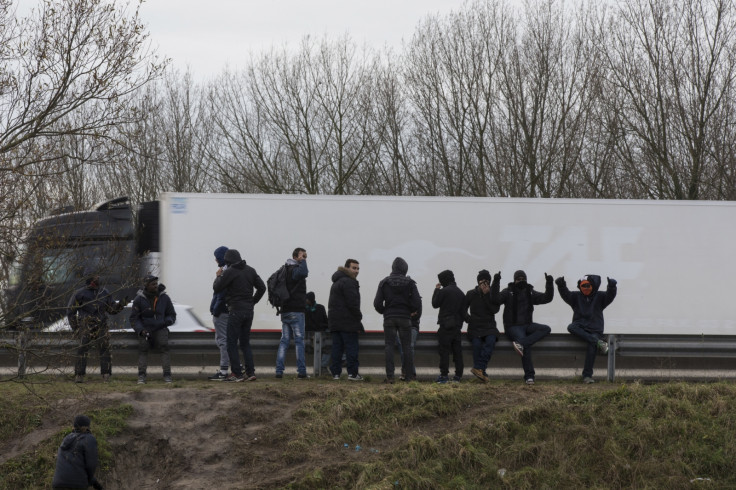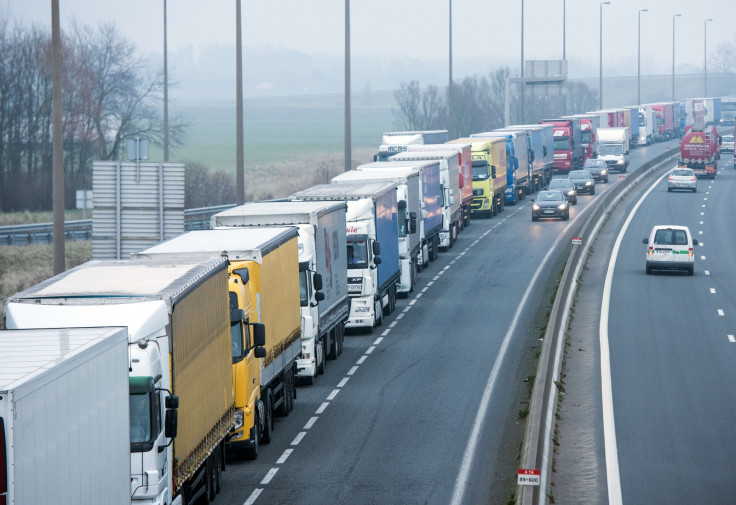Eurotunnel traffic disruptions were bonanza for Calais illegal migrants crossing to Britain

Traffic chaos at the Channel Tunnel was a bonanza for migrants in Calais who managed to cross to the UK in high numbers over the last week, an IBTimes UK investigation has revealed.
Asylum seekers encamped on the French side of the tunnel took full advantage of travel disruptions caused a by lorry fire, followed by issues to the power supply line.
Dozens are believed to have completed a dangerous trip to Britain, after jumping on vehicles that queued for hours on the roads leading to the tunnel.
Jacob, 24, said he was the last remaining of up to 40 South Sudanese asylum seekers who had been living in makeshift camp just off Calais Eurotunnel terminal over the last two months.
"They have all gone," he said, explaining that most crossed to the UK in the last week.
Charity workers in the port city also confirmed an exceptionally high number of migrants were able to reach their dream of a new life in Britain thanks to traffic jams.
"Usually when there are long queues like that more people pass [through]," said Maya Konforti, from local aid group l'Auberge des Migrants. "It is always difficult to give a figure, but there were definitely more [crossings] last week than usual".
She brought the case of a Pakistani migrant living at another camp, known as Tioxide for it lies near a factory of chemical manufacturer Huntsman Tioxide, who said 10 of his friends successfully exploited the disruptions and made it to the UK.
The illegal nature of the crossing makes such claims almost impossible to verify. However IBTimes UK visited several camps around Calais over the weekend and everywhere were stories of asylum seekers who, thanks to the Channel Tunnel problems, had made the final crossing.
Theirs is perilous journey, which often includes crossing the Sahara desert, squeezing on an overcrowded smuggler ship across the Mediterranean and walking their way up to Europe's closest point to Britain.

Long queues, in fact, consistently amplify migrants' chances of success.
In normal conditions, the hundreds who crouch every night near slow points of the roads leading to the port and tunnel terminal have only a few seconds to run to a truck, force the rear door open and hide inside.
Last week, power problems at the undersea link between Calais and Dover resulted in lorries being stuck for hours in a queue stretching for more than 20km of on the A16 highway near the French city.
In the run-up to Christmas, Eurotunnel's public affairs director, John Keefe had warned British MPs that holiday traffic could have boosted illegal immigration.
"The slower the flows of traffic through the border, the more opportunity there is for migrants to jump on to vehicles," he said, the BBC reported.
The Home Office said they were aware of the issue and the Border Agency had stepped up its efforts to avert illegal crossings during last week's disruptions, which came after months in which the migrant population in Calais has swelled to up to 2,300.
"Using some of the best technology in the world, our officers prevented more than 18,000 attempts to cross the Channel illegally in the year to April 2014 - a rise of more than 60% on the previous year," a spokesperson said.
"We have committed £12 million to help reinforce security at Calais. This includes installing security fencing and improving the flow of traffic at the port in order to reduce the risk of queuing vehicles being targeted by migrants. Around £3 million has already been invested to upgrade vehicle scanning equipment and increasing the use of search dogs.
"Following the Channel Tunnel fire last week, additional resources were moved to Calais to ensure border security was maintained."
© Copyright IBTimes 2025. All rights reserved.





















